Application Client Access Config
Application client access means to access your microservice to ShenYu gateway, currently supports HTTP, Dubbo, Spring Cloud, gRPC, Motan, Sofa, Tars and other protocols access.
Connecting the application client to ShenYu gateway is realized through the registration center, which involves the registration of the client and the synchronization of the server data. The registry supports HTTP, ZooKeeper, Etcd, Consul, and Nacos.
This article describes how to configure the application client to access the Apache ShenYu gateway. For related principles, see Application Client Access in the design document .
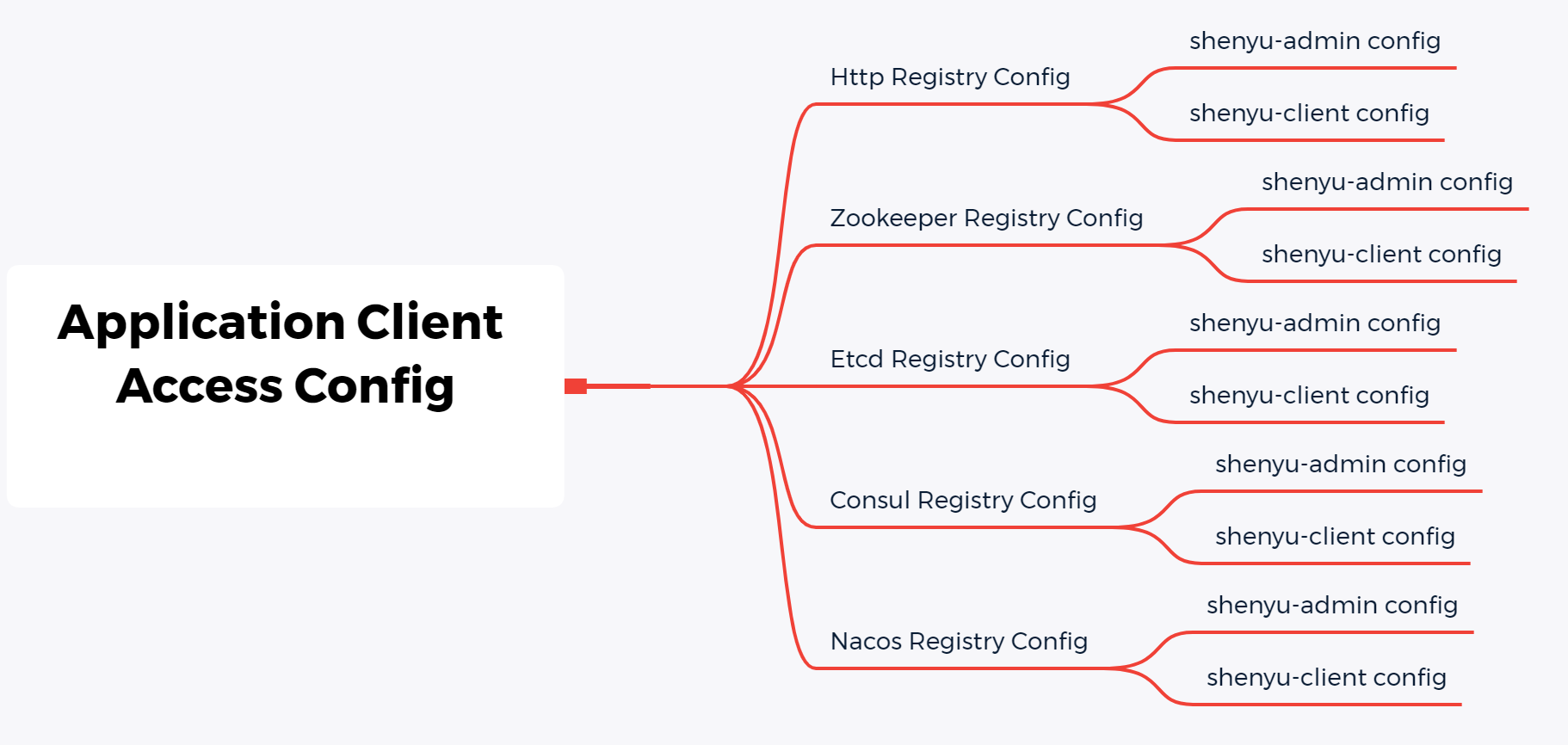
Http Registry Config
shenyu-admin config
Set the register type to 'Http in the yml file. The configuration information is as follows:
shenyu:
register:
registerType: http
props:
checked: true # is checked
zombieCheckTimes: 5 # how many times does it fail to detect the service
scheduledTime: 10 # timed detection interval time
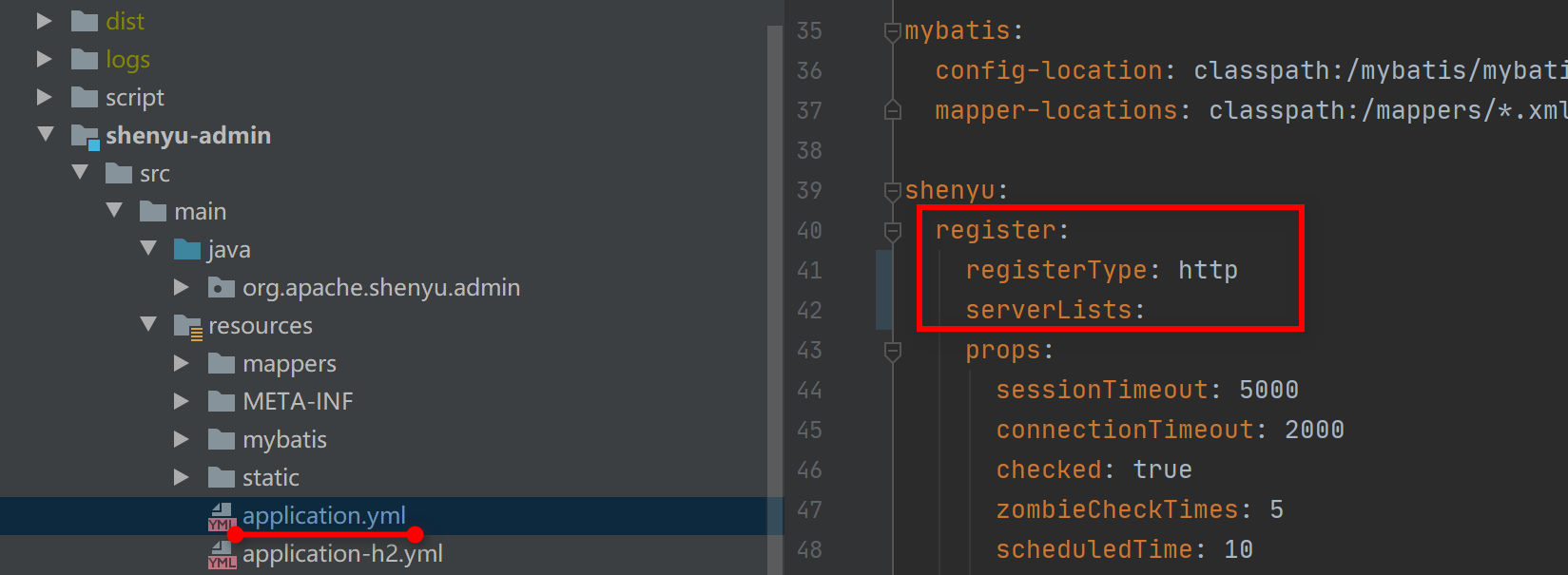
shenyu-client config
The following shows the configuration information registered through Http when the Http service accesses the Apache ShenYu gateway as a client. Other clients (such as Dubbo and Spring Cloud) can be configured in the same way.
shenyu:
register:
registerType: http
serverLists: http://localhost:9095
client:
http:
props:
contextPath: /http
appName: http
port: 8188
isFull: false
# registerType : register type, set http
# serverList: when register type is http,set shenyu-admin address list,pls note 'http://' is necessary.
# port: your project port number; apply to springmvc/tars/grpc
# contextPath: your project's route prefix through shenyu gateway, such as /order ,/product etc,gateway will route based on it.
# appName:your project name,the default value is`spring.application.name`.
# isFull: set true means providing proxy for your entire service, or only a few controller. apply to springmvc/springcloud
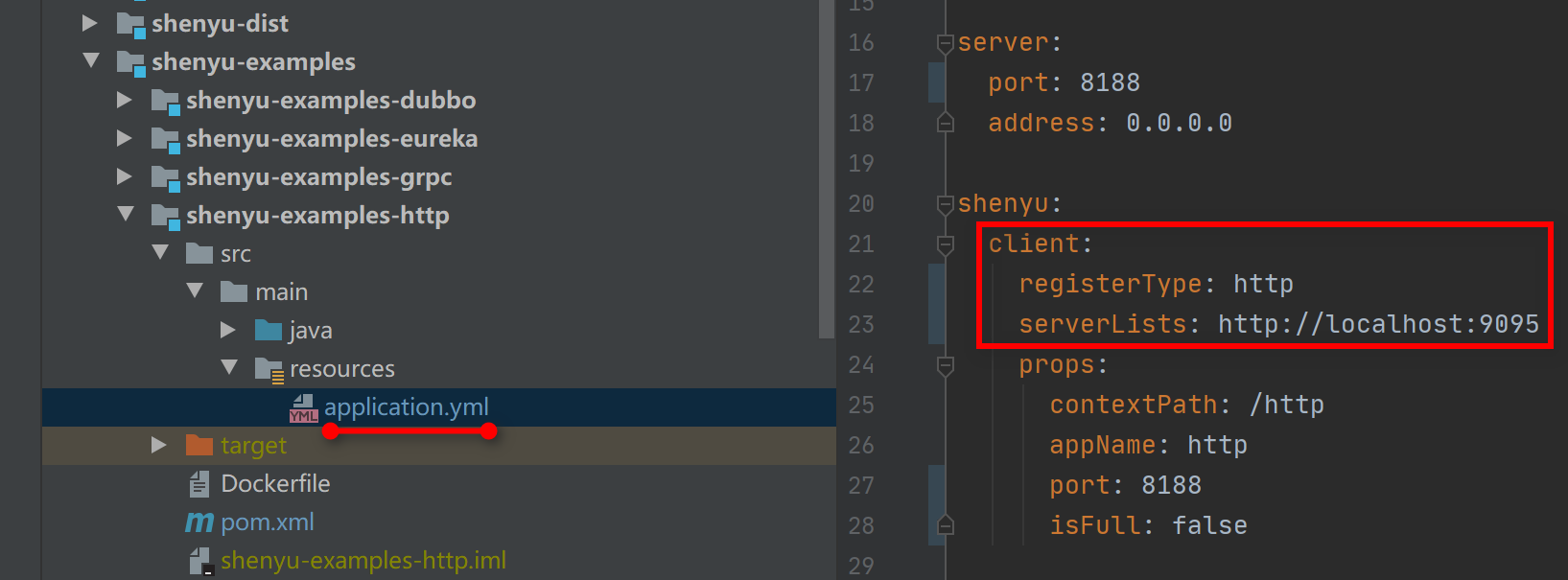
Zookeeper Registry Config
shenyu-admin config
First add the related dependencies to the pom file (already added by default) :
<dependency>
<groupId>org.apache.shenyu</groupId>
<artifactId>shenyu-register-server-zookeeper</artifactId>
<version>${project.version}</version>
</dependency>

- In the
ymlfile, set the register type tozookeeperand enter the service address and parameters ofzookeeper. The configuration information is as follows:
shenyu:
register:
registerType: zookeeper
serverLists: localhost:2181
props:
sessionTimeout: 5000
connectionTimeout: 2000

shenyu-client config
The following shows the configuration information registered by zookeeper when the Http service accesses the Apache ShenYu gateway as a client. Other clients (such as Dubbo and Spring Cloud) can be configured in the same way.
- First add dependencies to the
pomfile:
<!-- apache shenyu zookeeper register center -->
<dependency>
<groupId>org.apache.shenyu</groupId>
<artifactId>shenyu-register-server-zookeeper</artifactId>
<version>${shenyu.version}</version>
</dependency>

- Then set the register type to
zookeeperinymland enter the service address and related parameters as follows:
shenyu:
register:
registerType: zookeeper
serverLists: localhost:2181
client:
http:
props:
contextPath: /http
appName: http
port: 8189
isFull: false
# registerType : register type, set zookeeper
# serverList: when register type is zookeeper,set zookeeper address list
# port: your project port number; apply to springmvc/tars/grpc
# contextPath: your project's route prefix through shenyu gateway, such as /order ,/product etc,gateway will route based on it.
# appName:your project name,the default value is`spring.application.name`.
# isFull: set true means providing proxy for your entire service, or only a few controller. apply to springmvc/springcloud
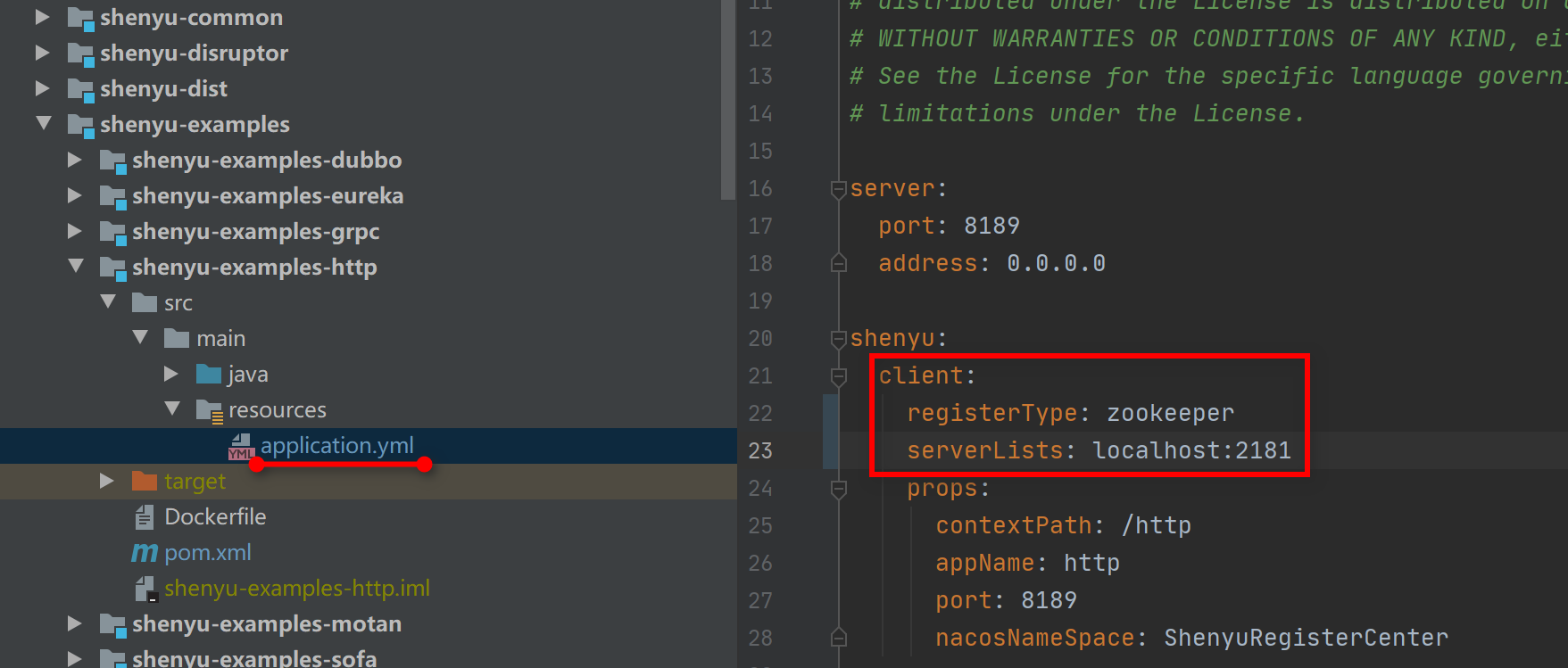
Etcd Registry Config
shenyu-admin config
First add the related dependencies to the pom file (already added by default) :
<dependency>
<groupId>org.apache.shenyu</groupId>
<artifactId>shenyu-register-server-etcd</artifactId>
<version>${project.version}</version>
</dependency>

- Then set register type to
etcdinymland enteretcdservice address and parameters. The configuration information is as follows:
shenyu:
register:
registerType: etcd
serverLists : http://localhost:2379
props:
etcdTimeout: 5000
etcdTTL: 5

shenyu-client config
The following shows the configuration information registered by Etcd when the Http service accesses the Apache ShenYu gateway as a client. Other clients (such as Dubbo and Spring Cloud) can be configured in the same way.
- First add dependencies to the
pomfile:
<!-- apache shenyu etcd register center -->
<dependency>
<groupId>org.apache.shenyu</groupId>
<artifactId>shenyu-register-server-etcd</artifactId>
<version>${shenyu.version}</version>
</dependency>

- Then set the register type to
etcdinymland enter theetcdservice address and related parameters as follows:
shenyu:
register:
registerType: etcd
serverLists: http://localhost:2379
client:
http:
props:
contextPath: /http
appName: http
port: 8189
isFull: false
# registerType : register type, set etcd
# serverList: when register type is etcd, add etcd address list
# port: your project port number; apply to springmvc/tars/grpc
# contextPath: your project's route prefix through shenyu gateway, such as /order ,/product etc,gateway will route based on it.
# appName:your project name,the default value is`spring.application.name`.
# isFull: set true means providing proxy for your entire service, or only a few controller. apply to springmvc/springcloud
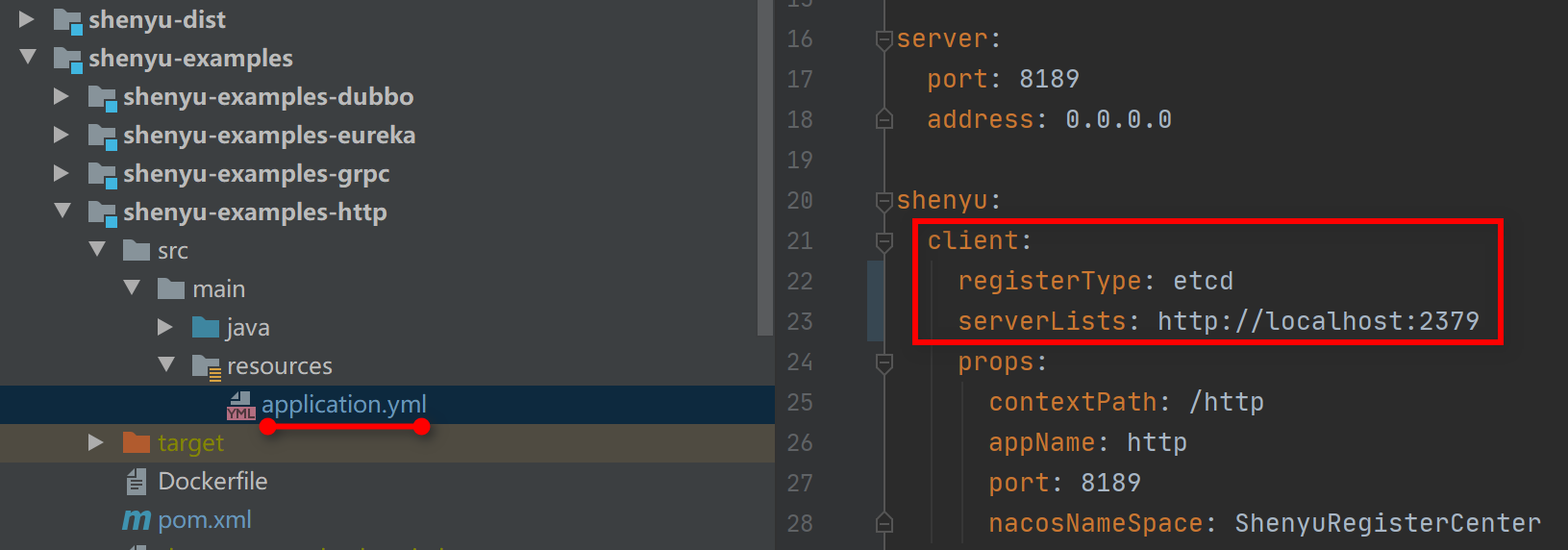
Consul Registry Config
shenyu-admin config
First add the related dependencies to the pom file :
<!-- apache shenyu consul register start-->
<dependency>
<groupId>org.apache.shenyu</groupId>
<artifactId>shenyu-register-server-consul</artifactId>
<version>${project.version}</version>
</dependency>
<!-- apache shenyu consul register start -->
<dependency>
<groupId>com.ecwid.consul</groupId>
<artifactId>consul-api</artifactId>
<version>${consul.api.version}</version>
</dependency>
<!-- apache shenyu consul register end-->
- In the
ymlfile to configure the registry asconsul, the unique configuration of consul is configured under the props node, the configuration information is as follows:
shenyu:
register:
registerType: consul
serverLists: localhost:8500
props:
delay: 1
wait-time: 55
name: shenyuAdmin
instanceId: shenyuAdmin
hostName: localhost
port: 8500
tags: test1,test2
preferAgentAddress: false
enableTagOverride: false
# registerType : register type, set consul.
# serverLists: consul client agent address (sidecar deployment (single machine or cluster), or the address of consul server agent (only one node of consul server agent can be connected, if it is a cluster, then there will be a single point of failure))
# delay: The interval of each polling of monitoring metadata, in seconds, the default value is 1 second.
# wait-time: The waiting time for each polling of metadata monitoring, in seconds, the default value is 55 second.
# instanceId: Required, Consul needs to find specific services through instanceId.
# name: The name where the service is registered to consul.
# hostName: When registering the type for consul, fill in the address of the registered service instance. The service instance address registered in the registry will not be used for client calls, so this configuration does not need to be filled in. Port and preferAgentAddress are the same.
# port: When registering the type for consul, fill in the port of the registered service instance.
# tags: Corresponding to the tags configuration in the consul configuration
# preferAgentAddress:Using the address corresponding to the agent on the consul client side as the address of the registered service instance will override the manual configuration of hostName
# enableTagOverride:Corresponding to the enableTagOverride configuration in the consul configuration
shenyu-client config
Register configuration information through the Consul method (the registry of the springCloud service itself can be selected at will, and there will be no conflict with the registry selected by shenyu, eureka is used in the example).
- First add dependencies to the
pomfile:
<!-- apache shenyu consul register center -->
<dependency>
<groupId>org.apache.shenyu</groupId>
<artifactId>shenyu-register-client-consul</artifactId>
<version>${shenyu.version}</version>
</dependency>
- Then set the register type to
consulinymland configshenyu.register.props, and related parameters as follows:
shenyu:
register:
registerType: consul
serverLists: localhost:8500
props:
name: shenyuSpringCloudExample
instanceId: shenyuSpringCloudExample
hostName: localhost
port: 8500
tags: test1,test2
preferAgentAddress: false
enableTagOverride: false
client:
springCloud:
props:
contextPath: /springcloud
port: 8884
# registerType : register type, set consul.
# serverLists: consul client agent address (sidecar deployment (single machine or cluster), or the address of consul server agent (only one node of consul server agent can be connected, if it is a cluster, then there will be a single point of failure))
# delay: The interval of each polling of monitoring metadata, in seconds, the default value is 1 second.
# wait-time: The waiting time for each polling of metadata monitoring, in seconds, the default value is 55 second.
# instanceId: Required, Consul needs to find specific services through instanceId.
# name: The name where the service is registered to consul.
# hostName: When registering the type for consul, fill in the address of the registered service instance. The service instance address registered in the registry will not be used for client calls, so this configuration does not need to be filled in. Port and preferAgentAddress are the same.
# port: When registering the type for consul, fill in the port of the registered service instance.
# tags: Corresponding to the tags configuration in the consul configuration
# preferAgentAddress:Using the address corresponding to the agent on the consul client side as the address of the registered service instance will override the manual configuration of hostName
# enableTagOverride:Corresponding to the enableTagOverride configuration in the consul configuration
Nacos Registry Config
shenyu-admin config
First add the related dependencies to the pom file (already added by default) :
<dependency>
<groupId>org.apache.shenyu</groupId>
<artifactId>shenyu-register-server-nacos</artifactId>
<version>${project.version}</version>
</dependency>

- Then in the
ymlfile, configure the registry asnacos, fill in the relatednacosservice address and parameters, andnacosnamespace (need to be consistent withshenyu-client), the configuration information is as follows:
shenyu:
register:
registerType: nacos
serverLists : localhost:8848
props:
nacosNameSpace: ShenyuRegisterCenter

shenyu-client config
The following shows the configuration information registered by Nacos when the Http service accesses the Apache ShenYu gateway as a client. Other clients (such as Dubbo and Spring Cloud) can be configured in the same way.
- First add dependencies to the
pomfile:
<dependency>
<groupId>org.apache.shenyu</groupId>
<artifactId>shenyu-register-client-nacos</artifactId>
<version>${shenyu.version}</version>
</dependency>

- Then in
ymlconfigure registration mode asnacos, and fill innacosservice address and related parameters, also neednacosnamespace (need to be consistent withshenyu-admin), IP (optional, then automatically obtain the local IP address) and port, configuration information is as follows:
shenyu:
register:
registerType: nacos
serverLists: localhost:8848
client:
http:
props:
contextPath: /http
appName: http
port: 8188
isFull: false
props:
nacosNameSpace: ShenyuRegisterCenter
# registerType : register type, set nacos
# serverList: when register type is nacos, add nacos address list
# port: your project port number; apply to springmvc/tars/grpc
# contextPath: your project's route prefix through shenyu gateway, such as /order ,/product etc,gateway will route based on it.
# appName:your project name,the default value is`spring.application.name`.
# isFull: set true means providing proxy for your entire service, or only a few controller. apply to springmvc/springcloud
# nacosNameSpace: nacos namespace
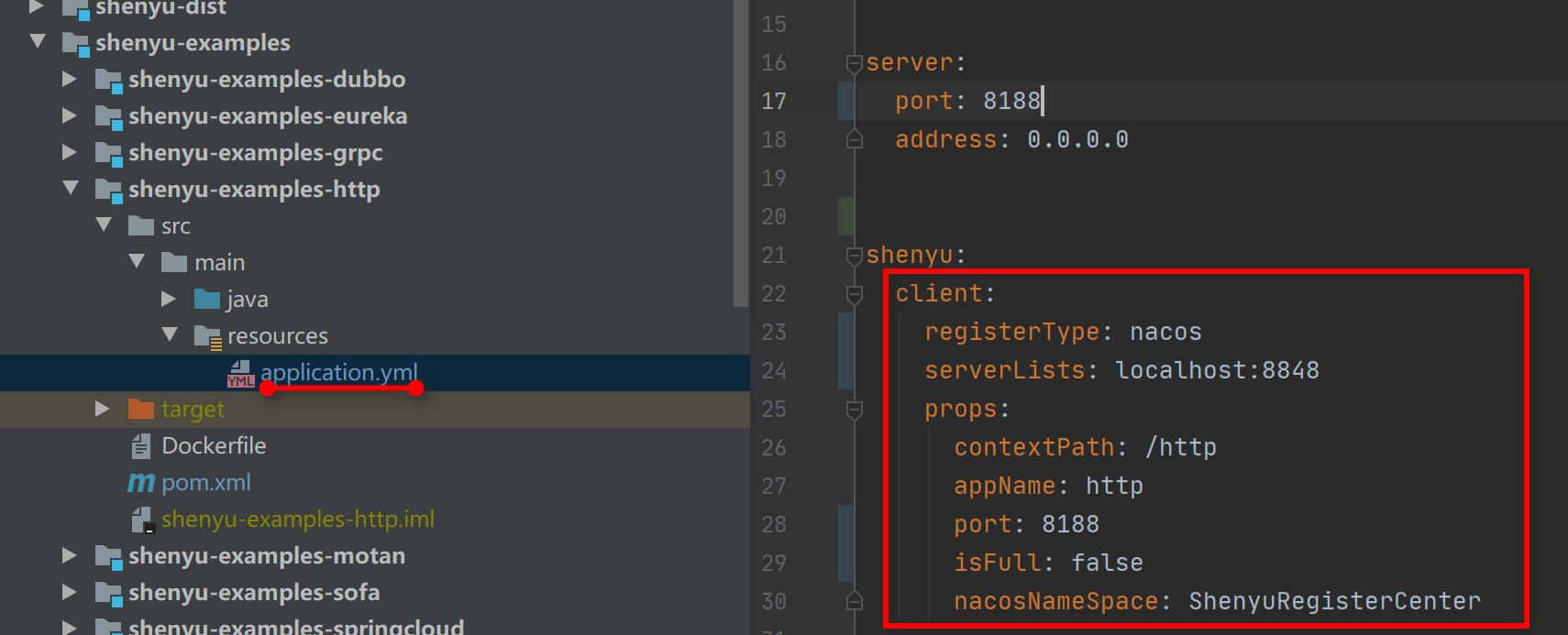
Register different type API at same time
follow example use the http and dubbo.
the yml configuration like follow:
shenyu:
register:
registerType: nacos
serverLists: localhost:8848
client:
http:
props:
contextPath: /http
appName: http
port: 8188
isFull: false
dubbo:
props:
contextPath: /dubbo
appName: dubbo
port: 28080
props:
nacosNameSpace: ShenyuRegisterCenter
# registerType : register type, set nacos
# serverList: when register type is nacos, add nacos address list
# http.port: your project port number; apply to springmvc
# http.contextPath: your project's route prefix through shenyu gateway, such as /order ,/product etc,gateway will route based on it.
# http.appName:your project name,the default value is`spring.application.name`.
# http.isFull: set true means providing proxy for your entire service, or only a few controller. apply to springmvc/springcloud
# dubbo.contextPath: your project dubbo service's context path
# dubbo.port: your project dubbo rpc port
# dubbo.appName: your project dubbo appliation name
# nacosNameSpace: nacos namespace
In conclusion, this paper mainly describes how to connect your microservices (currently supporting Http, Dubbo, Spring Cloud, gRPC, Motan, Sofa, Tars and other protocols) to the Apache ShenYu gateway. the Apache ShenYu gateway support registry has Http, Zookeeper, Etcd, Consul, Nacos and so on. This paper introduces the different ways to register configuration information when Http service is used as the client to access Apache ShenYu gateway.